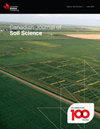Multi-frequency electromagnetic induction soil moisture characterization under different land uses in western Newfoundland
IF 1.5
4区 农林科学
Q4 SOIL SCIENCE
引用次数: 0
Abstract
Identifying and characterizing the spatial patterns in soil moisture variability under different land use conditions is crucial for agriculture, forestry, civil and environmental engineering. Yet employing multi-frequency electromagnetic induction (EMI) techniques to carry out this task is under-represented in boreal podzolic soils. This study: (i) compared four frequencies (2.8 ~ 80 kHz) for shallow mapping of soil moisture measured with a time-domain reflectometry at 0 – 20 cm soil depth under three different land-use conditions (agricultural land, field road, and a recently cleared natural forest), (ii) developed a relationship between apparent electrical conductivity (ECa) measured using multi-frequency EMI (GEM-2) and soil moisture and (iii) assessed the effectiveness of ECa as an auxiliary variable in predicting soil moisture variations under different land use conditions. The means of ECa measurements were calculated for the exact sampling location (ground truth data) in each land use condition at a research site, Pasadena, Newfoundland. Soil moisture–ECa linear regression models for the three land-use conditions were only statistically significant for 38.3 kHz frequency and were further analyzed. Further statistical analysis revealed that ECa was primarily controlled by soil moisture for the three land-use conditions, with the natural forest possessing the highest mean ECa and soil moisture. Geostatistical analysis revealed that cokriging ECa with less densely collected soil moisture improved the characterization accuracy of soil moisture variability across the different land use conditions. These results reveal the effectiveness of the georeferenced MF–EMI technique to rapidly assess intra-field soil moisture variability under different land uses.纽芬兰西部不同土地利用方式下多频电磁感应土壤水分特征
识别和表征不同土地利用条件下土壤水分变异的空间格局对农业、林业、土木和环境工程具有重要意义。然而,采用多频电磁感应(EMI)技术在北方白垩土中开展这项任务的代表性不足。本研究:(i)比较了三种不同土地利用条件(农田、田间道路和最近砍伐的天然林)下,用时域反射仪在0 - 20 cm土壤深度测量土壤水分的四种频率(2.8 ~ 80 kHz);(ii)建立了使用多频电磁干扰(GEM-2)测量的视电导率(ECa)与土壤湿度之间的关系;(iii)评估了视电导率作为预测不同土地利用条件下土壤湿度变化的辅助变量的有效性。在纽芬兰帕萨迪纳的一个研究地点,计算了在每种土地使用条件下精确采样位置(地面真实数据)的ECa测量平均值。3种土地利用条件下的土壤水分- eca线性回归模型仅在38.3 kHz频率下具有统计学显著性。进一步的统计分析表明,3种土地利用条件下的ECa主要受土壤湿度的控制,其中天然林的平均ECa和土壤湿度最高。地质统计分析表明,在土壤水分收集密度较低的情况下,cokriging ECa提高了不同土地利用条件下土壤水分变异特征的准确性。这些结果揭示了地理参考MF-EMI技术在快速评估不同土地利用方式下田间土壤水分变化方面的有效性。
本文章由计算机程序翻译,如有差异,请以英文原文为准。
求助全文
约1分钟内获得全文
求助全文
来源期刊

Canadian Journal of Soil Science
农林科学-土壤科学
CiteScore
2.90
自引率
11.80%
发文量
73
审稿时长
6.0 months
期刊介绍:
The Canadian Journal of Soil Science is an international peer-reviewed journal published in cooperation with the Canadian Society of Soil Science. The journal publishes original research on the use, management, structure and development of soils and draws from the disciplines of soil science, agrometeorology, ecology, agricultural engineering, environmental science, hydrology, forestry, geology, geography and climatology. Research is published in a number of topic sections including: agrometeorology; ecology, biological processes and plant interactions; composition and chemical processes; physical processes and interfaces; genesis, landscape processes and relationships; contamination and environmental stewardship; and management for agricultural, forestry and urban uses.
 求助内容:
求助内容: 应助结果提醒方式:
应助结果提醒方式:


